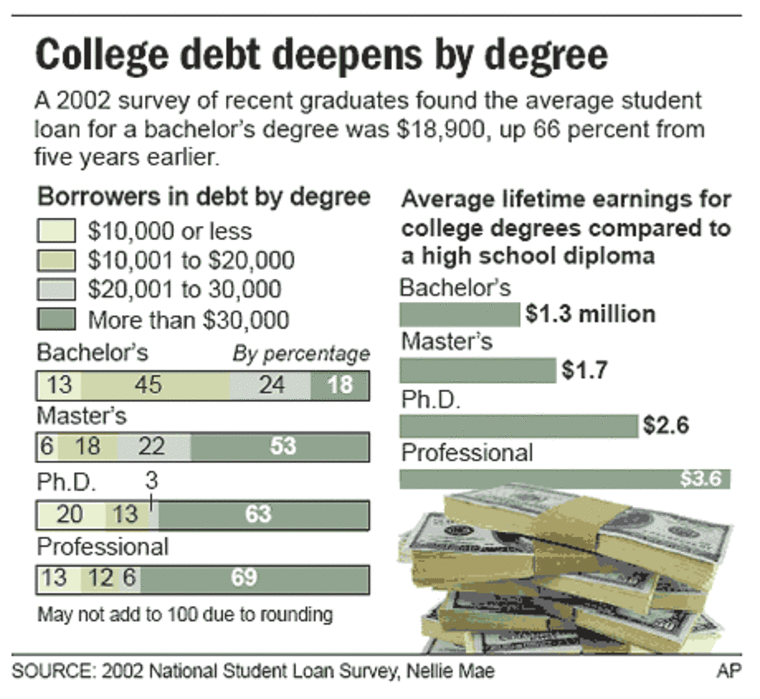Brennan Taylor has a good job, but spending $200 on his daughter's seventh birthday seems like "an awful lot."
"I'm trying to set a strict budget for the household," said Taylor, 34, a Madison, N.J., resident. "It's pretty stressful."
Taylor's finances and credit are hobbled by student loans — a fifth of his income every month goes toward paying down that debt. Surging college costs have saddled many people like him with steep debt at the start of their professional lives.
A 2002 survey of recent graduates by student loan company Nellie Mae found that the average student loan burden for a bachelor's degree was $18,900, up 66 percent from five years earlier.
Thanks to low interest rates and increased initial salaries, the average amount recent graduates were spending on debt repayment was just 7 percent of their annual incomes. That number that has been fairly unchanged for the last 10 years and is considered manageable.
But many graduates' debt burdens are well above average. And many who follow passions that aren't bankable, make a few financial missteps or are just plain unlucky can find their debts are out of control.
Cherise Fung, 30, put herself through Cornell University after her parents died during her freshman year. Because she took several leaves of absence, it took her 10 years to graduate. And she was already dealing with financial problems when she returned to school from her last leave.
"I still haven't recovered from that one semester. And that was in 2001," the Flanders, N.J., resident said.
Now, Fung is finding that her degree in anthropology isn't opening a lot of doors. Her expenses are hard to meet with the jobs she's been getting, mostly office work.
"There's times when I wonder if maybe I would have been better off getting a job and not bothering with college," she said.
Bachelor's degrees not enough for some
Part of the problem is that bachelor's degrees alone don't always cut it in today's workplace.
"The bachelor's degree has become the new high school degree," said Tamara Draut at Demos, New York-based think tank. A graduate degree is necessary to reach get to the top level of more and more professions.
"It's happening in education, business, even social work," Draut said.
Taylor got a graduate degree in Internet strategy management four years ago. It cost him $30,000 in loans, but has paid off with a job in Web publishing. Before that, he had "really crummy jobs."
Part of the reason he's still having trouble making ends meet is that his wife is working on a doctorate in anthropology and religion, a field where an advanced degree is practically necessary for work. She has racked up more than $100,000 in debt and has two more years to go.
"What I'm dreading is when my wife's going to be done, because that's going to be huge, and her income probably isn't going to help a lot," Taylor said.

Among the effects of higher debt, according to the 2002 Nellie Mae survey: 38 percent of graduates reported delaying buying a home because of their loans, up from 25 percent in 1991, and 21 percent postponed having children, up from 12 percent in 1991.
Because he's often a month behind on student loan payments, Taylor has had enough credit problems that he doubts he'll ever be able to afford a house. Besides, he said, his wife's loans will be almost "mortgage scale."
Fewer grants, more loans
As tuition costs and enrollment rose through the 1990s, grant money did not keep pace, meaning students have been shouldering an ever-increasing share of their education costs. While before, most were able to finance their studies with grants and part-time work, loans are now inescapable for many.
"This generation is the first to shoulder the costs of their college primarily through interest-bearing loans rather than grants," Draut said.
Jacqueline King, director at the American Council on Education's Center for Policy Analysis, believes the picture for more recent graduates may be even bleaker because the job market has weakened.
"I think that we've been insulated from feeling the full effect of the increased borrowing by the fact that interest rates have been low, and up until the most recent years, the job market has been good," King said.
Graduates can consolidate debt from so-called Stafford loans this year at rates as low as 3.375 percent. The rates are revised once a year based on Treasury bill yields. If current Treasury yields hold, the rates will be raised by about 1.2 percentage points in July.
Loans still a good idea
No matter the interest rate, however, student loans are a good deal. Over their lives, college graduates earn an average of $1.3 million more than those with only a high school diploma, according to Census Bureau data. For those with master's degrees, the premium grows to $1.7 million.
But the student loans are paid off relatively soon after graduation, while the bulk of the added earnings come later in life.
"I think this is serious problem in that young people are having problems securing themselves financially till they're in their 40s," said Draut.
The reliance on loans also places more responsibility in the hands of students at an age when not everyone is very responsible. But for those who make the right choices, the system works.
"I think a big part of it is picking what you get into," said Chris Moffatt, 23, who's studying aerospace engineering at Washington University in St. Louis.
He's done well with scholarships and grants, and expects to have just $40,000 in loans when he graduates in a year and half with two bachelor's degrees and a masters.
"It's sounds scary, but the interest is low and they work with you on consolidation and repayment," Moffatt said. "You just can't go and buy yourself a fancy car."
